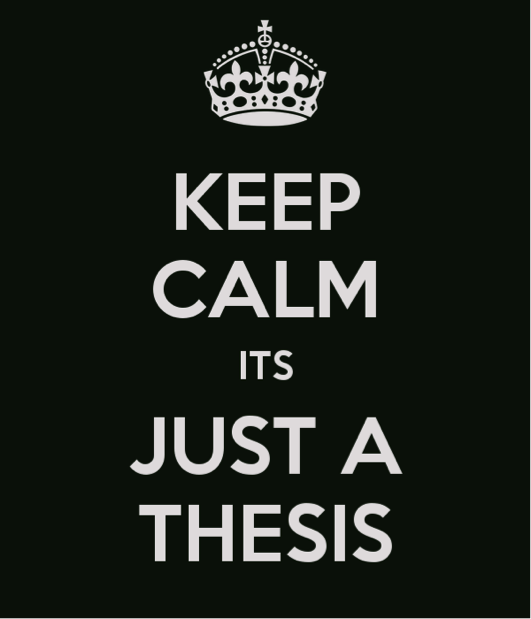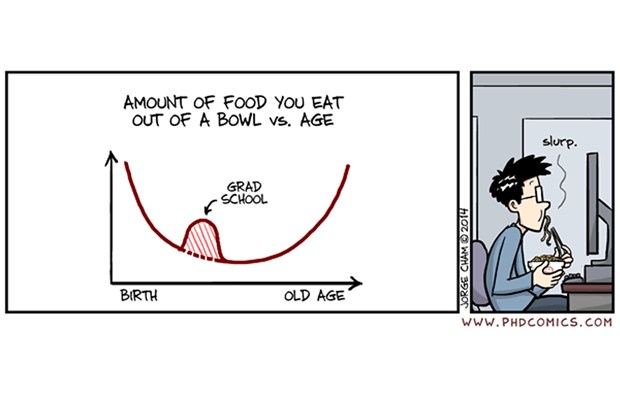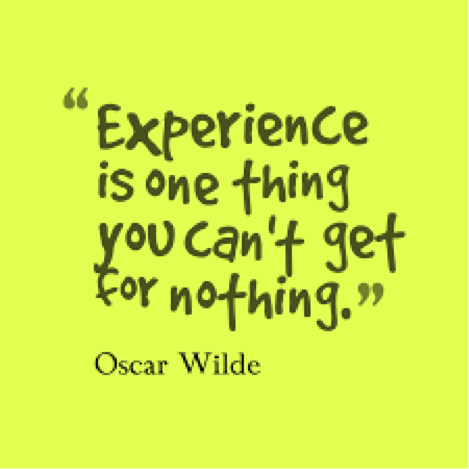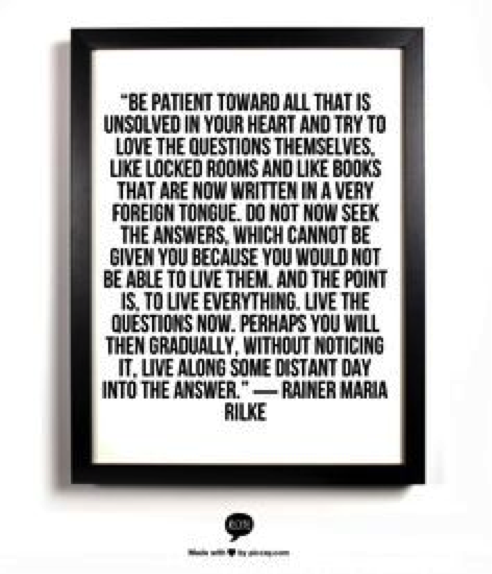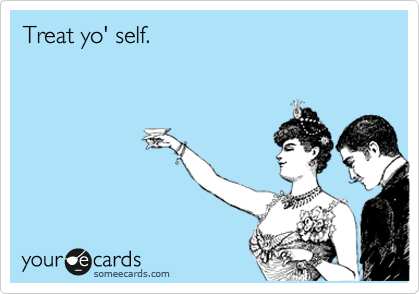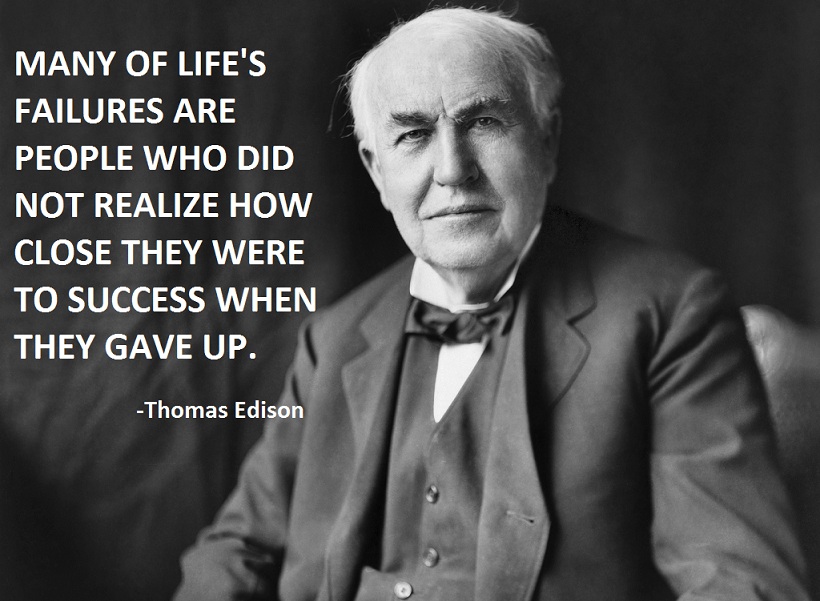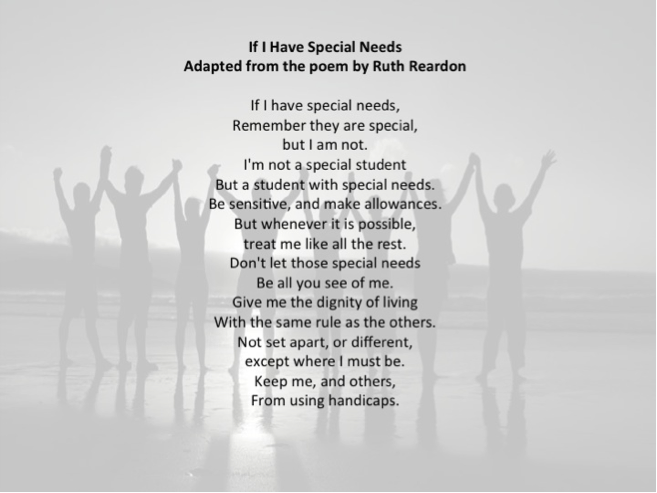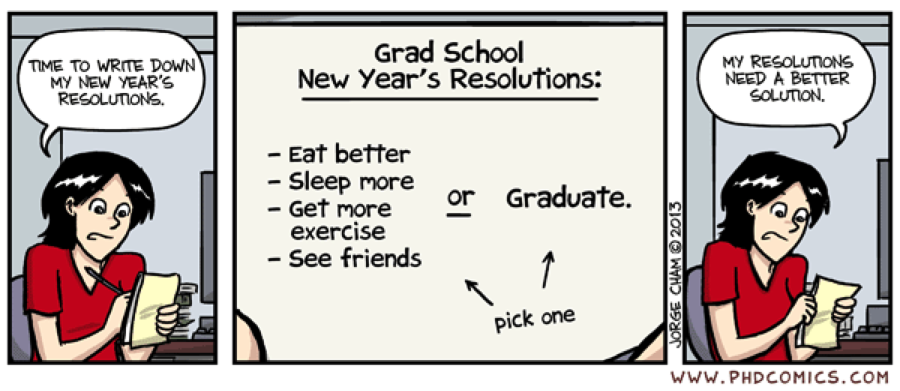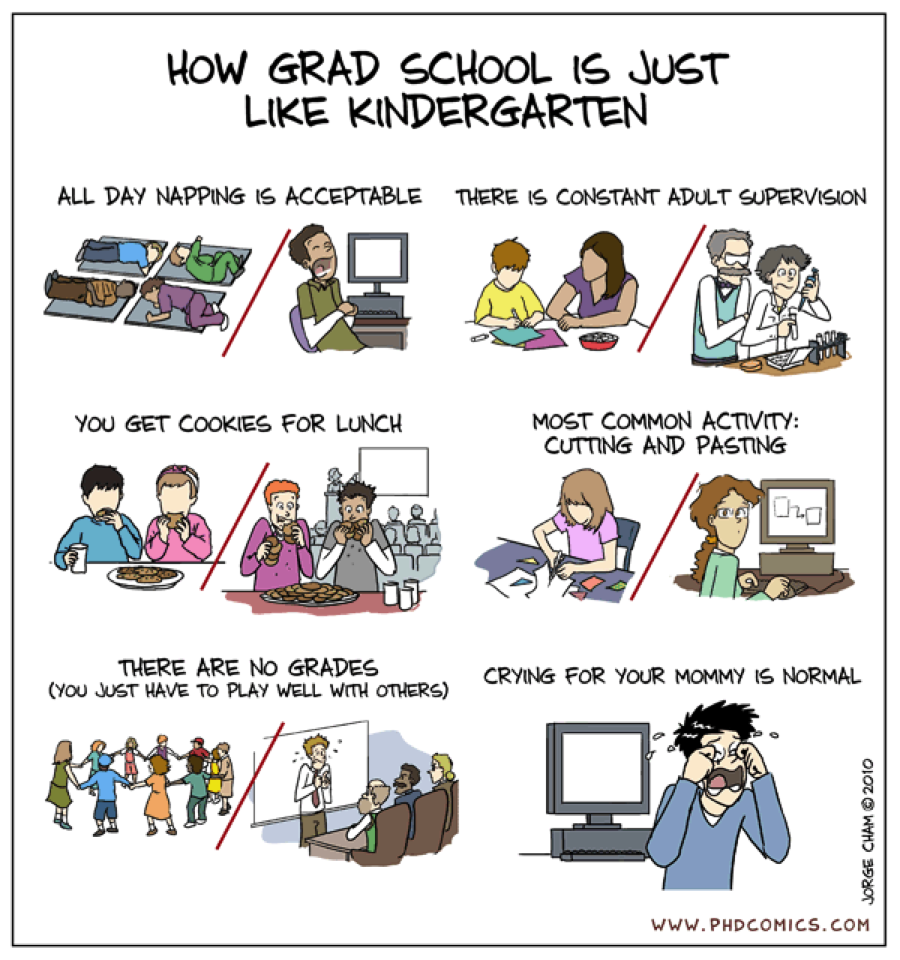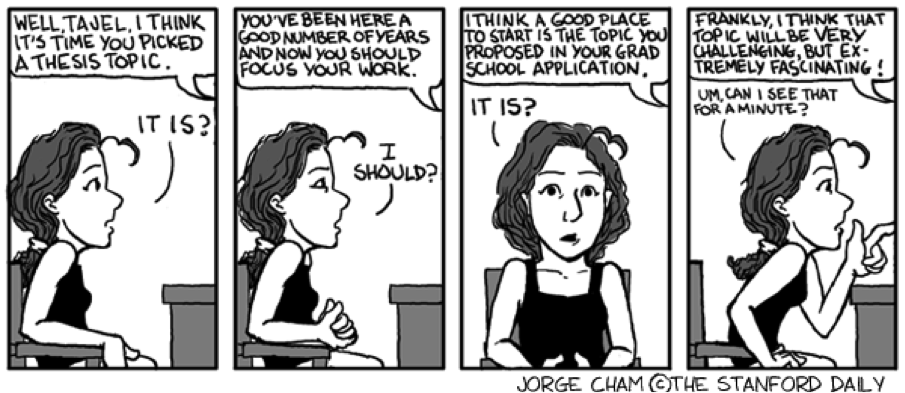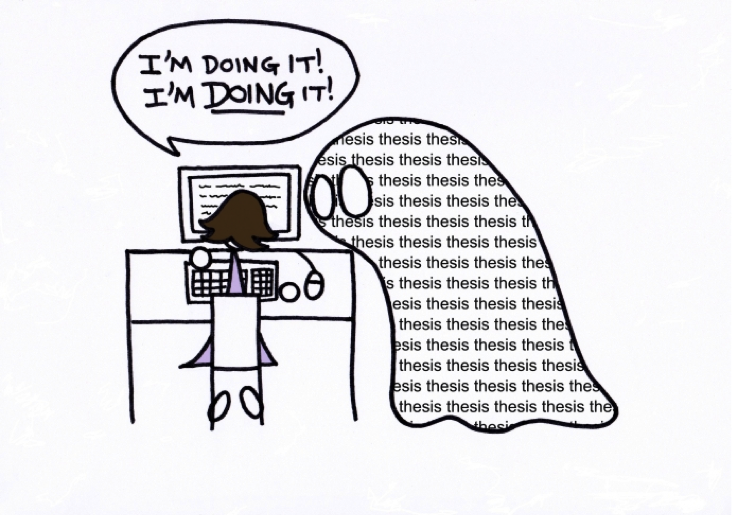This post is written by Marianne Vander Dussen.
Further to the Demystifying the Thesis post, I wanted to share some of the things that I have learned over the course of the past six months that may help in your own considerations of whether or not to pursue the thesis. I will be providing more information for a part 2 follow up after my data collection has commenced.
This post is grounded in personal experience, and is not meant to be a universal how-to, but rather to provide a contextualized perspective with the goal of making the thesis option more accessible.
If you have any questions whatsoever about what the thesis route entails, beyond this post, please contact your faculty advisor, or Michelann Parr (Graduate Studies Chair) at michelap@nipissingu.ca.
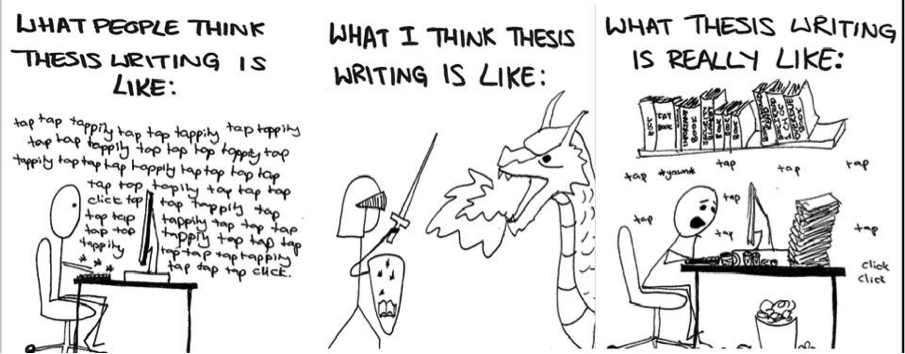
I have always known that I would pursue the thesis route in the Master’s program; but initially, it was because I didn’t actually realize that other pathways even existed! Several of my friends already have Master’s degrees under their belts, and had discussed their thesis work at length, so I assumed that thesis research was a necessary component of acquiring the MEd degree. However, even after I learned that there were two other routes (Major Research Paper (MRP) and Research Project and Seminar (RPS)), I remained committed to the idea of pursuing a thesis.
This was mainly due to my positioning and my long-term career goals.
I am a full-time student living very close to the Nipissing campus, where I have ongoing access to both my supervisor and other professors with knowledge in my field. I acknowledge that this is a privilege that most students in Nip’s online program will not have, and while it has certainly smoothed the way for taking the necessary steps required for thesis, it is still definitely doable for distance learners.
In terms of my long-term career goals, I wanted an opportunity to develop as both an academic writer and researcher, which the thesis route facilitates. I am very interested in eventually pursuing a PhD, and many universities require a demonstration of research work prior to admission and making decisions about funding. Plus, I knew that the Master’s was the ideal place to try doing research for the first time to decide if I even enjoyed it…if I couldn’t do a Master’s level thesis, would I even be up for doing a full dissertation?
If you ever intend on working as a faculty member at a university, ongoing research and contributions to the academic community are mandatory, and the earlier you develop your research skill-set, the better. I’ve had conversations with several people (who are outside of the university) who were under the false impression that once you scoop up a PhD, your research work is over, and then you can get yourself comfortably situated in a postsecondary institution, delivering lectures to the admiring hordes while resting upon your laurels. Nope, although that sounds lovely. If anything, the research gets more complex and longitudinal, so the Master’s is the perfect arena to experiment and get a little messy.
That being said, there are many who equate research with number crunching and staring at graphs, which is a method, but not the only method. I’ve just received ethical clearance on my research project, in which I have chosen narrative inquiry and participatory action research as my methodology, and it’s purely qualitative. This essentially means that I’ll be working directly with my participants as we create, explore, and converse. There may be some interviews as we progress, but they are guiding the work, and it will be an organic process. The methodology matches my experience and passion; I love storytelling, and so I get to use it as the tool through which I collect and disseminate my data. Qualitative is a recognized, valid, and respected approach to research, and it’s entirely possible to do a thesis through interviews, observations, and stories (so long as you’re able to provide a theoretical framework to support!).
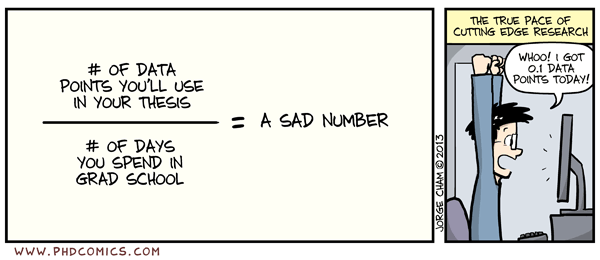
The ethics process itself was a little daunting, and it took me approximately one month to get the form to the point where my supervisor and I felt comfortable submitting. If you’re thinking about doing a thesis, I’d go to the website and print off the form, just to keep a copy by your desk. You never know, as you’re working through your courses, you could jot down an idea or two in the appropriate boxes, making it easier for when you need to go through and fill it out.
After I submitted to ethics, I received recommended revisions by email approximately one month later. It is unheard of that someone makes it through ethics on the first round, so do not have any expectations about being able to immediately start your research. Allow yourself a buffer zone. It took about a week or two to make the recommended changes (mostly because I just needed to take a few hours, sit down and focus on it), and I resubmitted. I received conditional ethical clearance one week later, pending the school board’s approval, which has its own separate procedure for approving researchers. You may wish to investigate this prior to applying to the Research Ethics Board, as you may be able to kill two birds with one stone in your applications.
Forming the backbone of your ethics application will be your research proposal. In all likelihood, you have one from your mandatory Research Methods course. For the purposes of submitting to your supervisor, second reader, and the Chair for approval, this will likely need to be fleshed out in order to meet with their expectations.
Whoa, wait, what? Second reader? Chair?
When you write your research proposal, you will require both a supervisor and a second reader. Usually, the second reader is another professor with experience in the field you will be researching in, allowing them to provide you with additional references, suggestions, and ideas that will be applicable to your work. Your supervisor or faculty advisor may have suggestions for who to approach to be your second reader.
Once both your supervisor and your second reader have approved your research proposal, it goes to the Chair (or to the Dean if the Chair is your supervisor). He/she will offer suggestions, revisions, questions, etc. Once you have passed through this process, you will be able to register for the thesis course, and you’re off to the races!
The process can be incredibly stressful, and sometimes seems about as clear as Mississippi mud water. I’ve done my fair share of fretting, worrying, and complaining. When I think about entering into the school in less than a month to meet and work with my participants, I feel like I am entering into the proverbial lion’s den, and I’m terrified. But I also have enough trust in myself to know that I will be fine, and that the path I’m walking is well-tread. Because I am passionate about the nature of my project, I’m allowing myself to be nudged along by the belief that it will all be for something.
While doing a thesis may not be for everyone, and that’s perfectly fine, it’s definitely the right decision for me. Don’t be discouraged by the idea of a defence, or feel dissuaded from investigating thesis options because you’re doing distance learning. Now that I’m past the first set of gates, I can see in retrospect that it was a series of small steps, as opposed to the gargantuan goliath-beast that I had initially conceptualized. Contact your school/school board (if you will be working in a school). Prepare your research proposal. Fill out and submit your ethics forms. Revise everything based on feedback. Resubmit. Receive approval (hopefully). If not, revise again, and that’s okay. You’ll be there before you know it.
For the MEd thesis handbook, including a step-by-step breakdown of the thesis process from start to finish, please visit here.
